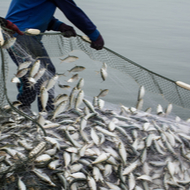Wildlife populations 'utilised' by humans in alarming decline

Among the worst affected species were marine populations from Asia-Pacific.
Wildlife populations used by humans for food, medicine and livelihoods are declining at a much faster rate than those that are not, according to new research.
The global study led by Zoological Society London (ZSL) found that populations of mammals, birds and fish 'utilised' by humans for fishing or hunting declined by 50 per cent on average between 1970 and 2016.
Researchers warn that if this decreasing trend continues, the plethora of pressures will become entirely unsustainable, threatening not only the existence of valuable species but also the lives of millions of local people who rely on them.
Louise McRae, lead author and ZSL researcher, said: “We know that the human use of wildlife can pose a threat to biodiversity if done unsustainably, but this is the first time we have quantified these impacts at the global scale. It is significant because not only are we losing biodiversity at an alarming rate, many people around the world also rely directly on wildlife for their livelihoods.
“The declines revealed in our study show that current levels of exploitation of wildlife may be unsustainable, but where management strategies are in place, dual benefits can be seen for both wildlife and people, so there are solutions that work.”
The study, published in One Earth, used data from scientific papers and reports of 2,944 species from seven continents - 1,348 of which were highlighted as 'utilised' by humans for hunting, fishing or collecting.
Among the worst affected species are those from tropical regions in Africa, terrestrial and freshwater species in the Americas, and marine populations from Asia-Pacific.



 Zoetis has launched a new survey to identify management techniques for Equine Herpes Virus (EHV).
Zoetis has launched a new survey to identify management techniques for Equine Herpes Virus (EHV).